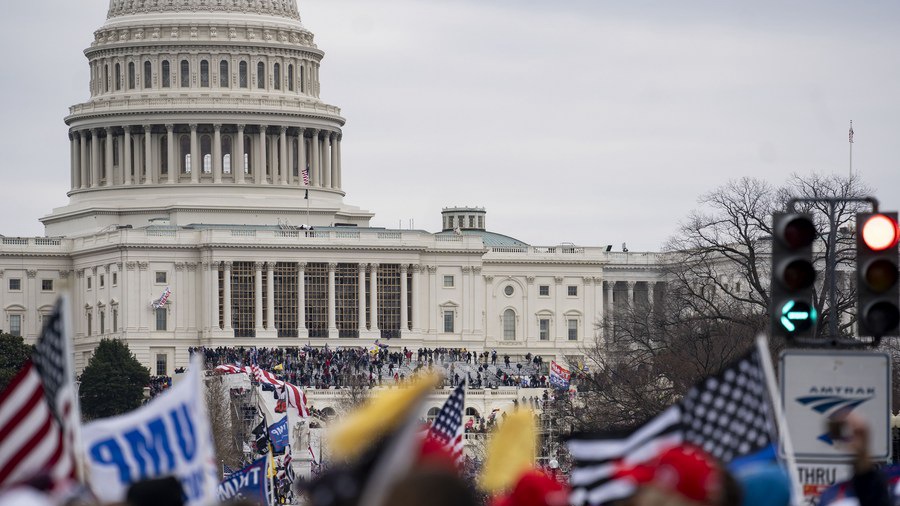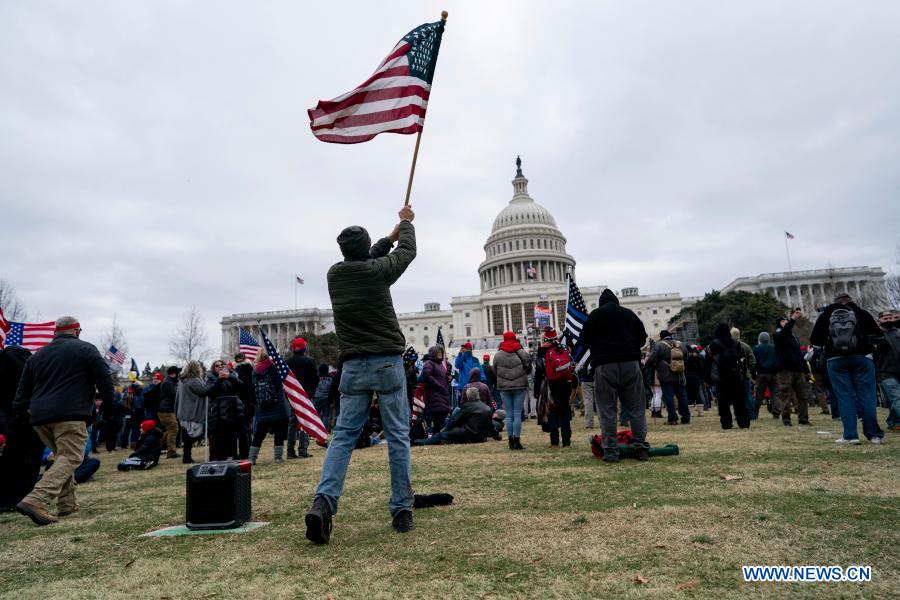
Supporters of U.S. President Donald Trump gather near the U.S. Capitol building in Washington on Jan. 6, 2021. /Xinhua
Supporters of U.S. President Donald Trump gather near the U.S. Capitol building in Washington on Jan. 6, 2021. /Xinhua
Editor's note: Bradley Blankenship is a Prague-based American journalist, political analyst and freelance reporter. The article reflects the author's opinions, not necessarily the views of CGTN.
Violent right-wing protesters stormed the U.S. Capitol on January 6 during the certification of the Electoral College votes that confirmed the victory of President-elect Joe Biden. Although current President Donald Trump was rebuked by leaders of his own party including Senate Majority Leader Mitch McConnell and Vice President Mike Pence, his most ardent supporters led in the mayhem.
It is shocking but not totally unsurprising to see how Trump, the "law and order" president, and police reacted to this event versus the Black Lives Matter (BLM) protests over the summer. Netizens have already been quick to point out the inconsistency; for example, the incident on June 1 when Trump unleashed police against peaceful protesters to snag a photo opportunity at Saint John's Church in the midst of the George Floyd protests compared to his encouragement when the Capitol was being seized by his supporters.
"These are the things and events that happen when a sacred landslide election victory is so unceremoniously & viciously stripped away from great patriots who have been badly & unfairly treated for so long," Trump even tweeted, prompting Twitter to lock his account.
BLM activists were met with rubber bullets, chemical irritants and beaten indiscriminately by law enforcement during the George Floyd protests. It was not uncommon to see people lose eyes, fingers, teeth or suffer other lifelong injuries at the hands of police. During those events, police were out in force and, especially in Washington D.C., unflinchingly. This time, Capitol police capitulated almost immediately and allowed right-wing extremists to seize the halls of Congress.

Supporters of U.S. President Donald Trump gather near the U.S. Capitol building in Washington, D.C., January 6, 2021. /Xinhua
Supporters of U.S. President Donald Trump gather near the U.S. Capitol building in Washington, D.C., January 6, 2021. /Xinhua
This is, however, not just the tale of two Americas nor a mere consequence of white privilege, though the differences are literally black and white. It is actually a reflection of the white supremacy that is very much alive not just amongst street reactionaries, but in core institutions meant to maintain the civil order – like the police.
It is indisputable that white supremacy was at the helm of the protests that eventually led to the Capitol riot, which includes groups like the Proud Boys, conspiracy theorists linked to the QAnon movement and prominent far-right activists that were present during the "Unite the Right" rally in Charlottesville, Virginia. According to several of the prominent extremists that were at the Capitol right, they were allowed into the building with zero resistance.
For a country that spends so much on national defense, the United States certainly has it well within their capability to make short work of insurrectionaries that seize the Capitol building. And if the police actually wanted to stop this, they would have been prepared for it and put up a serious fight – but they weren't, they didn't and there's a reason.
One clear reason is the fact that the police have always been a sure voting bloc for Trump as one police union after another endorsed the president during the 2020 election, and he had sure support amongst officers in 2016. The reason: his unrelenting racism and refusal to acknowledge that systemic racism plays a role in policing, which the police generally see as an attack on their authority (an extension of the white victimhood Trump taps into).
Sure enough, some police officers were seen live-streaming with the far-right insurrectionaries and, even if "not all cops" are like this, the general system of policing in America is very much rooted in white supremacy. There is little question among serious scholars about this.
So this is why it is not just white privilege in the sense that there is a double standard for Black people and white people before the criminal justice system, but rather a question of white supremacy. Or put another way, a question of white power – because when that privilege actually has power, has the ability to inflict violence (shoot or arrest people) and occupies public positions, then it is no longer simply a matter of privilege but something more sinister.
Incoming President-elect Joe Biden, who will helm a historically diverse administration, still faces some serious questions about how to tackle this.
(If you want to contribute and have specific expertise, please contact us at opinions@cgtn.com.)

